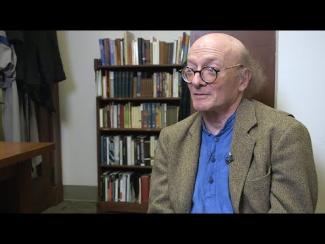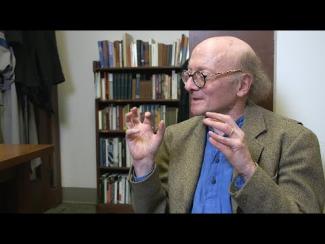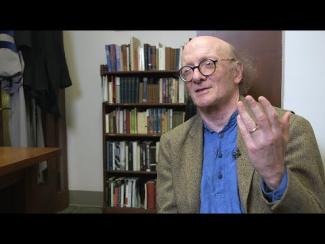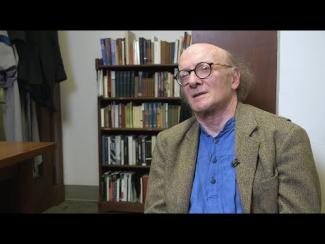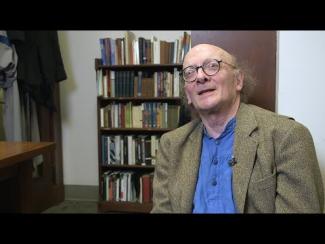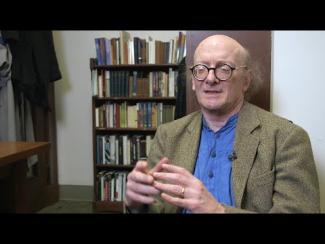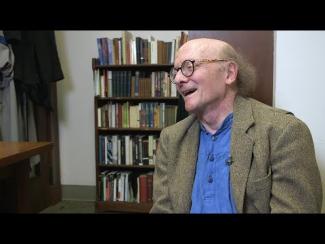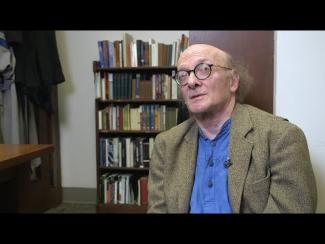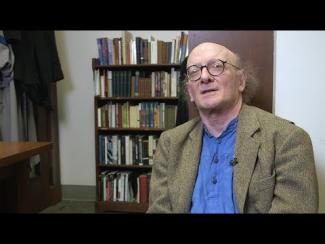The Yiddish Book Center's
Wexler Oral History Project
A growing collection of in-depth interviews with people of all ages and backgrounds, whose stories about the legacy and changing nature of Yiddish language and culture offer a rich and complex chronicle of Jewish identity.
Larry Rosenwald's Oral History
Larry Rosenwald—professor of English at Wellesley College, translator and translation theorist/critic—was interviewed by Christa Whitney on December 20th, 2018 at Wellesley College in Wellesley, Massachusetts. Larry was raised in Glencoe, outside of Chicago, with four siblings, one of whom is transgender. His Jewish family celebrated Christmas and Easter. His parents were leftists who read John Reed and Leon Trotsky and listened to Paul Robeson and the Weavers. They valued culture and civic engagement more than money or social status. He was good in school and liked tennis, bicycling, and playing the flute. Larry talks about the rather casual decisions that led to him attending Columbia University. He sang in the Columbia choir and the Cathedral of St. John the Divine and played the recorder with the Morningside Consort. Larry describes his involvement in the student protests at Columbia in 1968. Although he was an English major, by senior year he was focusing on languages. Larry thoroughly enjoyed a casual musical seder with students from the Yale School of Music which ignited an interest in his Jewish heritage. A few years later he got interested in learning Yiddish. In 1978, Larry accepted a fellowship at the University of Chicago, completed his dissertation on three early American diarists, and began taking a Yiddish course at Hillel. Larry talks about his road from a secular childhood to a more religious Jewish life once teaching in Boston. He considers rebellion against his family's beliefs and his love of music as contributing factors. Although he is still a staunch atheist, Larry finds something in Jewish music, language, and prayer that he doesn't find elsewhere, and he is comfortable with the contradictions. Larry's wife is a Quaker who was raised Baptist. They have twin daughters. He studied Torah with them in a coffee shop during their growing up years and has been involved in numerous chavurot [learning communities] that offered an alternative to organized religion. He became involved after one of his daughters was curious about how he could belong to a synagogue which would not accept her as a Jew. Larry and Yiddish scholar and translator Kathryn Hellerstein, who was recruited to Wellesley, began reading a story by I.J. Singer together and Larry decided to attempt an English translation. He joined a Yiddish-speaking group and published a piece in "The Mendele Review" which criticized a translation of some Dovid Bergelson stories. The prevailing attitude was that any translation of a Yiddish work was better than no translation. Larry's article hit a nerve and led to him being asked to serve on several prestigious Yiddishist advisory boards. Larry is currently working with the Yiddish Book Center's translation fellowship program and is writing more about Yiddish works rather than the adequacy of their translated versions. At length, he describes his philosophy regarding what makes a good translation and the importance of fidelity and capturing the rhythms of the original. In addition to his role in the English Department at Wellesley, Larry has taught in the program on Peace and Justice Studies and became a war tax resister. He is now working on a large project on literature and pacifism and notes that the Yiddish world view, the current Israeli political situation, and the pacifist world view often conflict. Larry talks about his love for Itzik Manger's works and the flourishing of Yiddish in the academy and in journals such as "In Geveb." For various reasons, Yiddish is good at building bridges between people who are very different politically and otherwise. He believes that there are many points of entry into the welcoming world of Yiddish, but it's important to become knowledgeable about the music, the texts, the grammar, and other aspects to really appreciate it.
This interview was conducted in English.
Larry Rosenwald was born in Chicago, IL in 1948.

